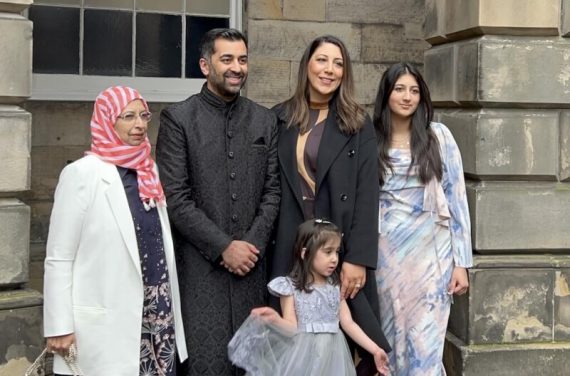H
umza Yousaf became the first minister of Scotland after narrowly winning the election for leader of the Scottish National Party. The health secretary received 52.1 percent of SNP members’ ballots, defeating finance secretary Kate Forbes, who received 47.9 percent.
Yousaf became Scotland’s first leader from an ethnic group and the first Muslim to head a democratic Western European country after he was sworn in as first minister on Wednesday, March 29, 2023, following a parliamentary decision on March 28.
In his victory speech, he said his “immediate priority will be to continue to protect every Scot as far as we can from the harm inflicted by the cost of living crisis, to recover and reform our NHS and other vital public services, to support our wellbeing economy and to improve the life chances of people across our country”. In addition, he attributes his success to his family, saying, “from the Punjab to our Parliament, this is a journey over generations that reminds us that we should celebrate migrants who contribute so much to our country”.
It is a narrow win over Forbes, an SNP rising star who campaigned as a change candidate, occasionally criticizing Yousaf and the SNP’s performance in government. Yousaf is close to former minister Nicola Sturgeon and campaigned on the promise of continuity — but the outcome underlines the difficult challenge he’ll face in rebuilding a party shaken by a contentious election.
Despite Yousaf winning the SNP leadership race, new polling performed by Ipsos Scotland between 17 and 21 of March suggests that the Scottish public are more favorable towards Kate Forbes than towards Humza Yousaf, while Nicola Sturgeon remains the most popular Scottish and Westminster political leader – ahead of all her potential successors – as well as beating Prime Minister Rishi Sunak, who has a favorability rating of 20%, in contrast to Sturgeon’s rating of 46%.
The First Minister’s newly appointed cabinet revealed:
- Shona Robison, the new Deputy First Minister, will take on the Finance portfolio, including responsibility for the Scottish Budget
- Michael Matheson becomes the Cabinet Secretary for NHS Recovery, Health and Social Care
- Jenny Gilruth joins Cabinet for the first time as Cabinet Secretary for Education and Skills
- Màiri McAllan joins Cabinet for the first time as Cabinet Secretary for Net Zero and Just Transition
- Neil Gray joins Cabinet for the first time as Cabinet Secretary for Wellbeing Economy, Fair Work and Energy
- Mairi Gougeon remains Cabinet Secretary for Rural Affairs, Land Reform and Islands
- Angus Robertson remains Cabinet Secretary for Constitution, External Affairs and Culture
- Shirley-Anne Somerville becomes Cabinet Secretary for Social Justice
- Angela Constance returns to Cabinet as the new Cabinet Secretary for Justice and Home Affairs
On Thursday, March 20, Parliament was requested to ratify the new ministerial nominations.
Humza Yousaf commented:
“The Cabinet team I have unveiled reflects the priorities that we will pursue as a government – including tackling child poverty, improving public services and building a fairer, greener economy”.
Controversies
Yousaf was one of 86 MSPs who supported the Scottish Gender Recognition Reform bill in December, which would have made it simpler for trans and non-binary people to acquire a gender-recognition certificate (GRC).
The legislation would have made it easier for trans people in Scotland to formally change their gender identity – without the need for a gender dysphoria diagnosis – and would have reduced the age at which a person can file for a Gender Recognition Certificate (GRC) from 18 to 16 years old. It would also reduce the time it takes to obtain formal acknowledgment of one’s gender from two years to a few months.
The measure was approved by the Scottish Parliament in December 2022 by a vote of 86 to 39.
The decision has sparked a lot of discussion about devolution and Scottish independence. The decision comes just two months after Scotland lost a supreme court attempt to conduct a secession vote without Westminster’s permission.
The measure was eventually blocked by the UK government under section 35, which Yousaf and others called an “unprecedented attack” on the Scottish parliament.
Concerns about the bill’s potential effect on women’s rights led the UK government to halt its implementation, citing a conflict with the UK Equality Act. Women’s rights activists have said that this strategy would undermine the safety of women-only spaces.
In an interview with Times Radio, Scotland’s former first minister Alex Salmond criticized Yousaf’s battle over Westminster, saying, “concentrate on self-determination, not self-identification.”
Recommended
Concerns over a potential independent Scotland
Yousaf, reaffirmed his commitment to take an independent Scotland to the EU while maintaining the rights of Scottish voters over their ‘constitutional future’, saying “as we make the case for Scottish independence, we will continue to govern well and demonstrate to the people of Scotland the benefits of decisions about their lives being taken here in Scotland”.
Prime Minister Rishi Sunak has warned new First Minister Humza Yousaf about plans for a second Scottish independence referendum. Sunak told Westminster’s Liaison Committee: “I think in elections people vote on all sorts of different things and I don’t think it’s appropriate to try and hijack a general election for one issue”.
“People in Scotland will vote on the various issues they think are important to them.” He added that Scottish voters made their votes known in the 2014 referendum.
The British Prime Minister then continued: “As I’ve always said, I think actually what people in Scotland want is to see their two governments working together to deliver for them.”





